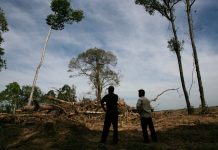Rising Fish Prices Amid Habitat Destruction Bite in a Sluggish Economy
Street-food sellers and residents say rising fish prices are steadily pushing some seafood out of financial reach for many, as advocates point to habitat destruction and plummeting fish stocks in natural lakes and rivers as driving up prices.
ពលរដ្ឋ១៧គ្រួសារទាមទារឲ្យម្ចាស់សំណង់ផ្ទះល្វែងមួយដោះស្រាយការជាប់គាំងរឿងសាងសង់
ប្រជាពលរដ្ឋ១៧គ្រួសារ ប្តឹងទាមទារឲ្យម្ចាស់បុរីមួយកន្លែងក្នុងខណ្ឌសែនសុខ ចូលខ្លួនមកដោះស្រាយ ដោយពួកគេអះអាងថា ម្ចាស់បុរីបានផ្អាកការសាងសង់ជិត៣ឆ្នាំដោយមិនមានមូលហេតុ។
បុគ្គលិកណាហ្គាវើលដ៍គ្រោងបន្តតវ៉ា ខណៈក្រុមហ៊ុនជូនដំណឹងថានឹងបើកទ្វាវិញនៅសប្តាហ៍ នេះ
បុគ្គលិកក្រុមហ៊ុនកាស៊ីណូណាហ្គាវើលដ៍មួយចំនួនអះអាងថា ពួកគេត្រូវបានជូនដំណឹងពីការបើកដំណើរការកាស៊ីណូផ្នែកខ្លះឡើងវិញនៅសប្តាហ៍នេះ ខណៈបុគ្គលិកមួយចំនួនទៀតគ្រោងបន្តទាមទារប្រាក់ឧបត្ថម្ភ៤០ដុល្លារពីរដ្ឋាភិបាល និងប្រាក់ខែ៥០ភាគរយក្នុងខែមិថុនាពីក្រុមហ៊ុន។
សង្គមស៊ីវិលគ្មានជំនឿលើការដាក់ទោសអ្នកមានអំណាចជុំវិញចំណាត់ការបែងចែកដីឱ្យពលរដ្ឋ
ក្រុមអង្គការសង្គមស៊ីវិលធ្វើការពាក់ព័ន្ធនឹងសិទ្ធិដីធ្លីសាទរចំណាត់របស់លោកនាយករដ្ឋមមន្រ្តី ហ៊ុន សែន ជុំវិញការបញ្ជាឲ្យកាត់ឆ្វៀលដី និងផ្តល់បណ្ណកម្មសិទ្ធិជូនពលរដ្ឋដែលបានកាន់កាប់ និងអាស្រ័យផលជាក់ស្តែងលើដីតំបន់ការពារធម្មជាតិ ប៉ុន្តែពួកគេមិនមានជំនឿថានឹងអាចមានការដាក់ទោសលើអ្នកមានអំណាចជុំវិញករណីនេះ។
កម្ពុជាលើកពេលប្រជុំកំពូលអាស៊ី-អឺរ៉ុបទៅពាក់កណ្តាលឆ្នាំ២០២១ដោយសារជំងឺកូវីដ១៩
កិច្ចប្រជុំកំពូលអាស៊ី-អឺរ៉ុប (ASEM) លើកទី១៣ ដែលមានកម្ពុជាធ្វើជាម្ចាស់ផ្ទះសម្រាប់ដឹកនាំកិច្ចប្រជុំនៅខែវិច្ឆិកានេះ ត្រូវបានសម្រេចលើកពេលទៅពាក់កណ្តាលឆ្នាំ២០២១វិញ ដោយសារការរីករាលដាលជំងឺកូវីដ១៩។ នេះបើតាមសេចក្តីប្រកាសព័ត៌មានរបស់ក្រសួងការបរទេសកម្ពុជា។
Often Injured Digging for Scraps, Scavengers Want Residents to Separate Their Trash
After a morning pulling a cart full of scraps — old books, cans and bottles — Mean Ang, 50, sits in the shade of a house in Boeung Salang commune in Phnom Penh’s Prampi Makara district.
Some Phnom Penh Public Events Continue to Be Canceled
Last-minute, city-ordered cancellations of several public events in recent weeks were due to continued caution around coronavirus, City Hall said, though one environmental group questioned whether authorities were going too far and silencing activists.
ធនាគារអេស៊ីលីដា ហៅរបាយការណ៍របស់សង្គមស៊ីវិលអំពីបំណុលកម្មករ ថាជាការបង្កឲ្យមានចលាចល
ធនាគារអេស៊ីលីដា នៅថ្ងៃសុក្រនេះ បានចេញសេចក្តីថ្លែងការណ៍មួយ ដោយបានហៅការចុះផ្សាយរបាយការណ៍របស់អង្គការសង្គមស៊ីវិលមួយក្រុមពាក់ព័ន្ធនឹង «ការជំពាក់បំណុលវ័ណ្ឌករបស់កម្មករក្នុងវិស័យកាត់ដេរ» ថាជា «ការបំភ្លៃ និងបង្កឲ្យមានចលាចលក្នុងសង្គម»។
សំណុំរឿងព្រហ្មទណ្ឌជិត៣៥០០ករណីត្រូវបានដោះស្រាយក្នុងរយៈពេល៤២ថ្ងៃ
សំណុំរឿងព្រហ្មទណ្ឌនៅតាមសាលាដំបូងរាជធានី ខេត្ត ដែលកកស្ទះជិត៣,៥០០ ករណី ត្រូវបានដោះស្រាយ បន្ទាប់ពីអនុវត្តយុទ្ធនាការដោះស្រាយការកកស្ទះសំណុំរឿងអស់រយៈពេល៤២ថ្ងៃ។ នេះបើតាមសេចក្តីប្រកាសព័ត៌មានរបស់ក្រសួងយុត្តិធម៌។
កម្ពុជាត្រៀមសណ្ឋាគារចំនួន៨បន្ថែមទៀតដើម្បីដាក់អ្នកដំណើរបរទេសឲ្យនៅដាច់ដោយឡែក
ក្រសួងសុខាភិបាលកម្ពុជានៅថ្ងៃសុក្រនេះ ប្រកាសត្រៀមសណ្ឋាគារចំនួន៨ថែមទៀត ដើម្បីដាក់ជនបរទេសធ្វើដំណើរមកប្រទេសកម្ពុជាឲ្យនៅដាច់ដោយឡែក ក្នុងករណីមានផ្ទុកជំងឺកូវីដ១៩ និងអ្នកដែលត្រូវបានសង្ស័យថាអាចមានជំងឺកូវីដ១៩ ។
LGBT Community Hit Hard by Social Changes Amid Coronavirus
Job losses and increased pressure from families have hit LGBT community members in Cambodia as well as Southeast Asian countries especially hard in recent months due to the effects of coronavirus, according to activists.
Tbong Khmum ‘Safety Hill’ Hopes to Spare Thousands of Families From Flash Flooding
Up to 3,000 families will be able take shelter from floods once Tbong Khmum — the country’s youngest province — completes its 10-hectare “safety hill,” which was announced by governor Chan Sophorn last week.
ក្រសួងកសិកម្មកំពុងស្វែងរកទីផ្សារមៀនប៉ៃលិននៅប្រទេសចិន ខណៈអ្នកដាំត្អូញត្អែរពីតម្លៃ
រដ្ឋមន្រ្តីក្រសួងកសិកម្មកម្ពុជាបញ្ជាក់ថា ក្រសួងកំពុងសិក្សារកទីផ្សារមៀនប៉ៃលិននៅប្រទេសចិន ខណៈអ្នកដាំមួយចំនួនត្អូញត្អែរថា មៀនប៉ៃលិនដែលពួកគេកំពុងដាំមានតម្លៃថោក។
អ្នកដើររើសអេតចាយ ចង់ឲ្យមានការបែងចែកប្រភេទសំរាមដើម្បីបង្ការការរងរបួសពេលរើស
កំពុងអង្គុយឈប់សម្រាកក្រោមម្លប់ឈើមុខផ្ទះមួយម្តុំបឹងស្រឡាង ក្រោយទាញរទេះពោរពេញទៅដោយអេតចាយដែលភាគច្រើនជាក្រដាសសៀវភៅពេញមួយព្រឹក លោក មាន អាន គឺជាអ្នកដើរទិញ និងរើសអេតចាយម្នាក់ ដែលបានប្រកបរបរនេះអស់រយៈពេលជាង៣ឆ្នាំមកហើយ។
ម្ចាស់ចំការទំពាំងបាយជូរពីរនាក់ នៅខេត្តពីរផ្សេងគ្នា ប្តេជ្ញាបន្តបង្កើនទិន្នផល ទោះបីរដ្ឋាភិបាលគ្មានវិធានការគាំទ្រ
កសិករពីរនាក់នៅខេត្តពីរផ្សេងគ្នា កំពុងបង្កើនការដាំដំណាំទំពាំងបាយជូរយ៉ាងដើម្បីប្រមូលផលពង្រីកទីផ្សារ ខណៈក្រសួងកសិកម្មពុំទាន់មានវិធានការគាំទ្រ និងរកទីផ្សារទំពាំងបាយជូនៅឡើយ។
កម្មករកាត់ដេរជាង៥០នាក់តវ៉ានៅមុខក្រសួងការងារទាមទារឲ្យរោងចក្របើកប្រាក់ខែ
កម្មកររោងចក្រ ញូបេស គ្លូបល ថេកស្តាយ ក្នុងខេត្តកំពង់ស្ពឺជាង៥០នាក់ នៅថ្ងៃចន្ទនេះ បានតវ៉ានៅមុខក្រសួងការងារ ទាមទារឲ្យមានការដោះស្រាយ ក្រោយថៅកែមិនបើកប្រាក់ខែឲ្យកម្មករអស់ជាងបួនខែ។
























